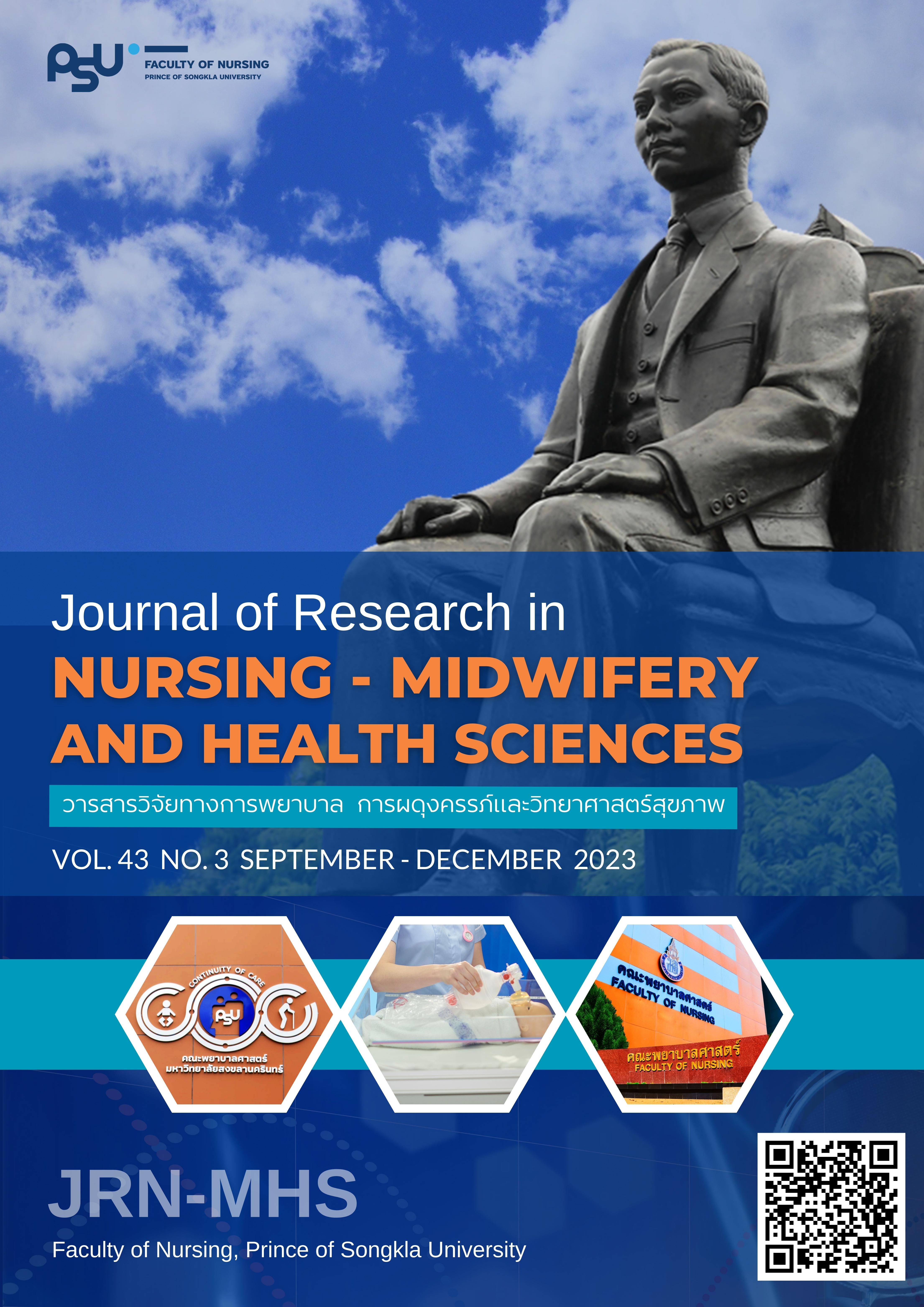The Happiness Level During Nursing Clinical Practice of Second Year Nursing Students
Main Article Content
Abstract
Objective: This study aimed to describe the happiness level of second year nursing students during nursing clinical practice Methods: The participants of descriptive study were 121 second year nursing students who had experiences of nursing clinical practice. Two instruments were used to collect data, 1) The Demographic Data Form and 2) The level of happiness in Nursing Science Bachelor’s degree questionnaire, which were examined for content validity by 3 experts. The level of happiness in Nursing Science Bachelor’s degree questionnaire, which was examined for internal consistency reliability, yielded the Cronbach’s alpha coefficient of .94. Data was analyzed using descriptive statistics. Result: The findings showed the overall mean score of happiness in second year nursing students was at high level (M = 3.98, SD = .76). Conclusion: The result of this study should be used for design the further course to increase happiness level of nursing students during nursing clinical practice.
Article Details

This work is licensed under a Creative Commons Attribution-NonCommercial-NoDerivatives 4.0 International License.
References
Thanyasawad T, Kankarn W, Ugsornwong R. The development of health literacy programs affects knowledge, behavior and performance correct use of drugs in non-communicable diseases of village health volunteers ubon ratchathani province. JRTAN. 2022; 23(3): 402-8. Thai.
Inaim P, Chuto C, Panutat S. The result of preparation on operational readiness on the first practice of nursing students [Internet]. Ubon Ratchathani; Ratchathani University; 2017 [cited 2023 Jul 17]. Available from: https://nursemis2.ratchathani.ac.th/file_re/98m4spiWed102816.pdf.
Tantalanukul S, Wongsawat P. Factors associated with stress among nursing students at Boromrajonani Colleges of Nursing in Thailand Northern Region under the Jurisdiction of Ministry of Public Health. TiS. 2022; 19(13): 4641. Thai.
Dangtern L. Factor influencing stress among nursing students of faculty of nursing during clinical practice [dissertation].[Phitsanulok]: Naresuan University; 2015. 70 p.
Chaiwcharn T, Papol A. The stress of nursing student training. EAU Heritage Journal Science and Technology. 2021; 15(1): 21-8. Thai.
Nochit W, Yotthongdi N, Leksanga W, et al. Factors predicting stress and stress management of bachelor program of nursing students. AJPBRU. 2020; 10(1): 118-28. Thai.
Vinijkul S, Reansuwong S, Sukarate P. Relationship between academic environment, learning happiness, and academic achievement of nursing students at Kuakarun Faculty of Nursing. KJN. 2014; 21: 7-24. Thai.
Wongrostrai Y, Deenamjoed W. Happy learning among undergraduate nursing students. JONAE. 2020; 13(1): 43-57. Thai.
Jamjang S, Autthamaytakun W, Pitaksin D. The effect of readiness preparation for nursing practice in ward of 2 nd year nursing students, Borommarajonnani College of Nursing, Ratchaburi. J Sci Tech UBU. 2018; 20(3): 147-63. Thai.
Sihawong S, Foongdee N, Yanarom N, et al. Factors causing to stress of nursing students, Ubon Ratchathani University. HCU Journal. 2018; 21(42): 93-106. Thai.
Bundasak T, Chaowiang K, Jangasem N. Happity learning among nursing students. JMPS. 2017; 5(1): 357-69. doi: 10.14456/jmcupeace.2017.28. Thai.
Thongsom P. The development of indicators of happiness in learning of students in nursing science undergraduate programs under the ministry of public health. JONAE. 2011; 4(1): 88-111. Thai.
Rathachatranon W. Determining an appropriate sample size for social science research: The myth of using taro Yamane and Krejci & Morgan method. Journal of Interdisciplinary Research: Graduate Studies. 2019; 8(1): 11-28. Thai.
Sukcharoen P, Polruk J, Petchsuk R. The happiness in studying as perceived by nursing students. JPNC. 2020; 31(2): 158-70. Thai.
Jampated N, Buntan W, Pantasee P. Student and teaching factor in correlation with happy learning in fundamentals of nursing, practicum of nursing student, Faculty of Nursing, Hauchiew Chalermprakiet University. HCU Journal. 2015; 19(37): 1-14. Thai.
Kasemsuk K, Wichainate K. A study of the happiness of air force student nurses. JRTAN. 2017; 18(3): 228-35. Thai.
Harabutra T, Panyanidnugool C, Panomrit S, et al. Variables related to happiness among nursing students, Faculty of Nursing, Kasem Bundit University. JKBU. 2019; 20(2): 68-80. Thai.
Khamthana P, Polin S. Quality of life among nursing student, Prachomklao College of Nursing, Phetchaburi Province. JNSU. 2019; 20(38): 123-33. Thai.
Altiok HO, Ustun B. The stress sources of nursing student. Educ. Sci.: Theory & Practice. 2013; 13(2): 760-6.
Poonnotok P, Napkasorn C. Factors related to happiness of undergraduate nursing students, Faculty of Nursing, Burapa University. NJPH. 2016; 26(3): 118-29. Thai.
Hirsch CD, Barlem ELD, Tomaschewski JM, et al. Predictors of stress and coping strategies adopted by nursing students. Acta Paul Enferm. 2015; 28(3): 224-9. doi: https://doi.org/10.1590/1982-0194201500038.
Wongkamin A, Ronnarong C, Koontalay A. Factors relating to the first clinical practice of nursing students adaptation. JHRI. 2018; 2(4): 23-32. Thai.
Chaiwong N, Maneepun N. The effect of the resilience enhancement program on adjudgment of the first year nursing students in faculty of nursing at Buriram Rajabhat University. udhhosmj. 2020; 28(3): 315-25. Thai.
Wongsaree C. Teaching to critical thinking in generation z nursing students: A review of literature. JRTAN. 2019; 20(1): 21-30. Thai.
Tantalanukul S, Wongsawat P. Stress and stress management in nursing students. BCNUT J Nurs. 2017; 9(1): 81-92. Thai.


